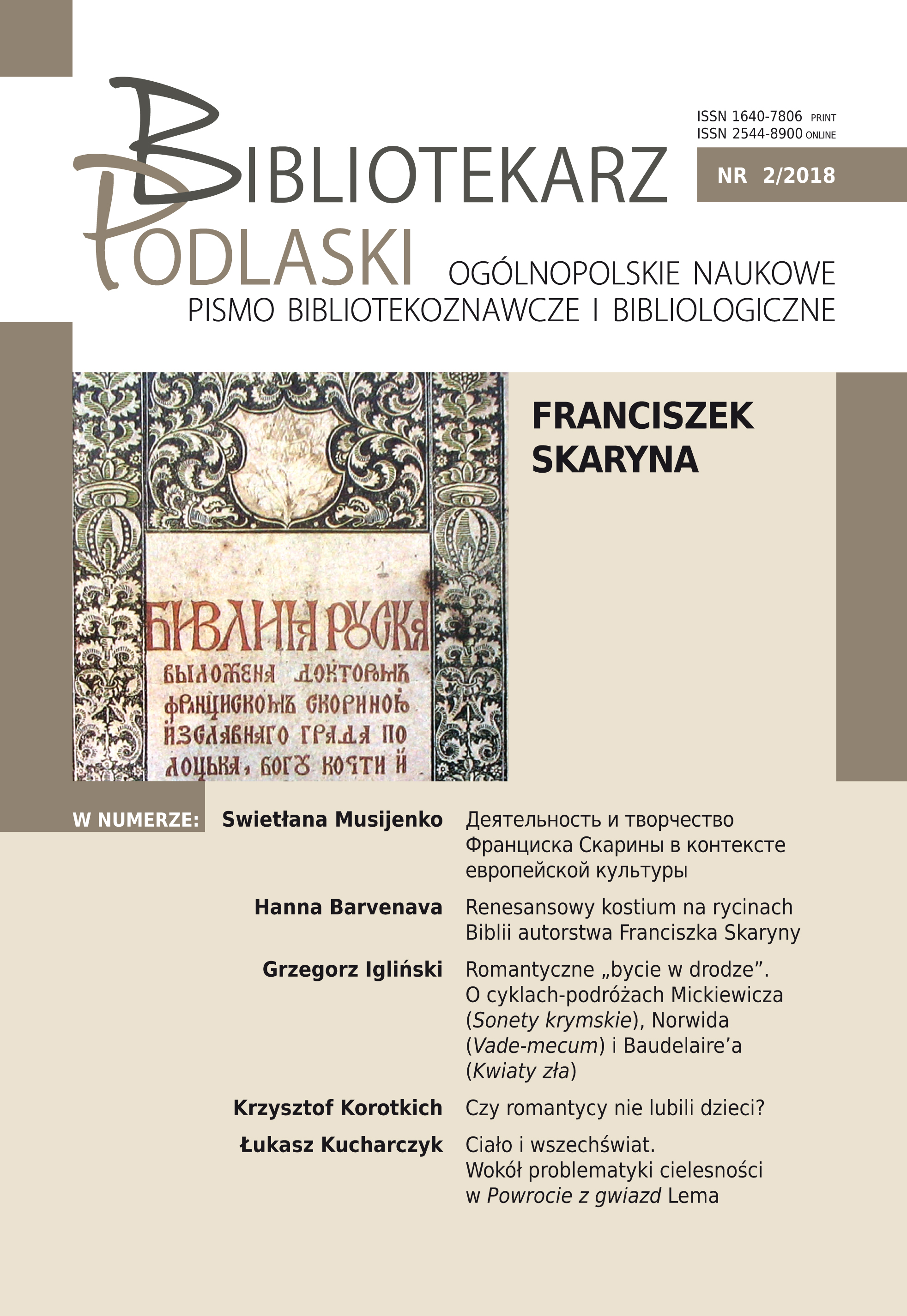Abstract
Scholarly research into Francysk Skaryna’s legacy has been initiated by J.V. Bacmejster in 1776 and V.S. Sopikow in 1813. Further research conducted in the 20th century by Alexander Bilecki, Pavel Popov, Yaroslav Isayevich, U. Anichenko and contemporary studies of Halyna Kovalchuk, Alexandr Nauvov, Mariola Walczak-Mikolajczak and others, demonstrate how important were Skaryna’s activities on the border of two great traditions. In this context, the problem of “Skaryna and Ukraine” is worth analyzing in all its contexts: biographical, publishing, polygraphic, academic, and bibliographical. Ukrainian episode in Skaryna’s life and his birth town of Połock is related to the cult of Saint Euphrosyne of Połock, who established the first female monastery and is considered a patron of female monasticism of Rus.
The polygraphic context of Skaryna’s activities is tied to Western Europe. Having obtained a doctorate in medicine at the University of Padua, he visited Venice, one of the most prominent printing and publishing
centers (for Slavic, Greek and Hebrew texts), where he also mastered modern printing techniques. While in Prague, Skaryna used two-color printing technique to publish 'The Song of Songs' and to print the title
page of 'Biblia Ruska'. In Vilnius, the two-color printing technique was applied to print five chapters of the Bible and just one title page of the Book of Psalms.
Skaryna’s activities played a major role in the cultural and scientific progress of Ukraine in the 16th century: books that were published in Prague and Vilnius became benchmarks of publishing craft and inspired Ukrainian authors of manuscripts such as Ivan Vyshenskyi, Luka of Tarnopol, Dmytro Zinkov and others. Yaroslav Isayevich proves that Skaryna maintained close contacts with Ukrainian cultural reformers and even attempted to establish a printing house in Western Ukraine. A unique copy of Skaryna’s 'Biblia Ruska' was found in the Kyiv-Pechersk Lavra book collection (currently in the National Library of Russia in St. Petersburg). Some of other Skaryna’s works are kept in a manuscript collection of Lviv Library and hetman Ivan Samoylovych.
References
Ìsaêvič Âroslav, Skorina i počatok knigodrukuvannâ na Ukraїnì, [v:] Francysk Skaryna ì âgo čas: Èncyklapedyčny davednìk, Mìnsk 1988, s. 493.
Ìstorìâ ukraїnsʹkoj lìteraturi, Tom drugìj. Davnâ lìteratura (drugaâ polovina XV–XVIII st.). Navukovì redaktori: Vira Sulìma, Mìkola Sulima, vidavnictvo „Navukova dumka”, Kiїv 2014, s. 115.
Kovalʹčuk Galina, Izučenie i popularizaciâ naslediâ Franciska Skoriny ukrainskim učёnym P. N. Popovym, [u:] Materìaly XI Mižnarodnyh knigaznavčyh čytannâŭ ŭ Mìnsku 16–17 krasavika 2015 g., „Knižnaâ kulʹtura Belarusì XI – pačatku XX st.”, skladalʹniki: G. U. Kìrêeva, T. A. Sapega, A. A. Suša, Mìnsk 2015, s. 19.
Kovalʹčuk Galina, Vklad člena-korrespondenta AN USSR P. N. Popova v izučenie knižnoj kulʹtury, [v:] Berkovskie čteniâ 2015. Knižnaâ kulʹtura v kontekste meždunarodnyh kontaktov: Materialy tretʹej Meždunarodnoj naučnoj konferencii v Minske 26–27 maâ 2015 goda, Minsk–Moskva 2015, s. 188–193.
List Sergìâ Maslova do Ûrìâ Meženka vìd 27 veresnâ 1932 roku, Ìnstitut rukopisìv Nacìonalʹnoї Bìblìoteki Ukraїni ìm. Vernadsʹkogo, fond 33 (arxiv Sergìâ Maslova), od. zb. 4893.
Popov Pavlo, Vidavec Georgij Skorina, „Drug čitača”, 1965, № 43 (289), s. 3.
Žuravsʹkìj A. I., Francysk Skaryna ì âgo čas, [u:] Èncyklapedyčny davednìk, Mìnsk 1988, s. 343–344.
Articles published in the “gold open access” mode on the basis of a non-exclusive license agreement between the publisher and the author. Permitted use:
- the publication may be read and stored on any device,
- the publication may be cited (with obligatory reference to the author, the title of the text, as well as the full title, bibliographic address of the issue and page of the journal)
The editorial team of “Bibliotekarz Podlaski” implements an open access policy by publishing materials in the form of the so-called Gold Open Access. From volume 42 (issue 1/2019), the journal is available under the Creative Commons license (Attribution – ShareAlike: CC BY-SA).
The key declarations of the Open Access and Open Science movement, which we fully support, are available on the CEON Open Science website.
COPYRIGHT:
The editorial team of “Bibliotekarz Podlaski” implements an open access policy by publishing materials in the form of the so-called Gold Open Access. The journal is available under the Creative Commons license – Attribution – ShareAlike 4.0: International: CC BY-SA 4.0).
The key declarations of the Open Access and Open Science movement, which we fully support, are available on the CEON Open Science website.
“Bibliotekarz Podlaski” allows its readers to read, download, copy, distribute, print, search and link to the full content of articles. We enable full, immediate, unlimited (both in a territorial, temporal and technical sense) open access to all published content, in accordance with the principle that freely available research increases and accelerates the global development of science and the exchange of knowledge.
The editorial team of “Bibliotekarz Podlaski” encourages authors to place articles published in the journal in open repositories (after the review or the final version of the publisher), provided that a link to the journal’s website is provided.
The journal does not charge the authors any fees for accepting and publishing their texts.

